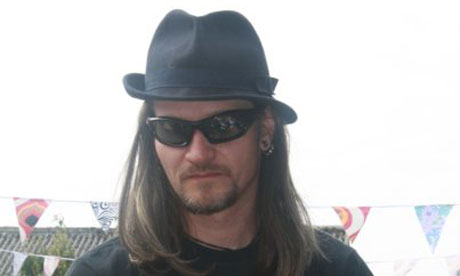 |
| Photograph: Guardian/ caption: OD STAR, HEROIN DEALER, OR MR. PIG? |
But I digress...
The following is from the Guardian.
Activists challenge convictions in wake of police spy revelations
Twenty environmental activists are seeking to overturn recent criminal convictions in the wake of the Guardian's revelations about a network of undercover police officers embedded deep in the movement.
Lawyers for the group claim that a failure to disclose the role of covert police operative Mark Kennedy during their trial may have led to a miscarriage of justice and have written to the Crown Prosecution Service demanding details of his role.
Six other activists walked free from court earlier this week after their lawyer, Mike Schwarz, demanded details of the part played by Kennedy in planning the environmental protest they took part in at Ratcliffe-on-Soar power station, near Nottingham, in 2009.
However, last month, in a separate trial, the 20 green campaigners were convicted of conspiracy to commit aggravated trespass during the same protest, after failing to convince a jury that their actions were designed to prevent immediate harm to human life and property from climate change.
"The police allowed this trial, unlike the later one, to run all the way to conviction," said Schwarz, whose firm, Bindmans, represents both groups of protesters. "In the light of events last week, this must be seen as a potential miscarriage of justice."
Revelations of PC Kennedy's activities by the Guardian this week have triggered a crisis in undercover policing. He is alleged to have played a central role in organising a proposal to break into the power station.
Kennedy used the fake identity "Mark Stone" to live for seven years in the protest movement, infiltrating activist groups in 22 countries. He had sexual relationships with a number of women. He also revealed the identity of another undercover officer to fellow activists, leading to a security operation this week as police tried to ensure all their undercover officers were safe.
An investigation into the collapse of the trial of the six activists is expected to be launched shortly by the Independent Police Complaints Commission. The body is also considering widening its inquiry to take into account whether or not Kennedy acted as an agent provocateur during his years undercover. A further review into the wider undercover operation and those organising it may also follow.
The case of Kennedy and the other undercover officer – a woman the Guardian is calling Officer A after representations from senior police officers – has thrown a spotlight on the role of secretive police intelligence units, overseen by the Association of Chief Police Officers, to which Kennedy and Officer A were seconded.
Today the former director of public prosecutions Lord Macdonald said the handling of undercover officers appeared to be "alarming" and "opaque". "There should be published guidelines," he said. "It is particularly important that the public understands what the principles and what the rules are. The fact this operation is so opaque, nobody knows how it was run, what the objectives were, why it ran for so long. I think that's quite alarming."
The defence used by the 20 convicted activists – known as "necessity" – is similar to one that has been used successfully in the past by environmental protesters. In 2008, six Greenpeace activists were acquitted of causing criminal damage after scaling a chimney atKingsnorth power station after convincing jurors that they sought to protect property around the world threatened by climate change.
But the defence relies on convincing a jury that defendants genuinely believed they were acting through "necessity" to prevent death and serious injury caused by carbon dioxide emissions and climate change. During last month's trial of the six Ratcliffe-on-Soar defendants, the prosecution argued that they were not really intending to stop carbon emissions, but instead engaged in a publicity stunt.
But the activists' lawyers now believe that Kennedy, who they say was central to the protest from the moment the idea was hatched, would have been in a prime position to reject that claim.
Kennedy has been described by activists involved in the Ratcliffe action as having been "in the thick of it". His name appeared on receipts for the hire of a 7.5-tonne truck to transport equipment for the protest. He used his fake passport and driving license for the transaction, which cost a £778.
In a letter to the CPS seen by the Guardian, the lawyers have asked for disclosure of material relating to Kennedy "any other undercover officers or informers" that could have undermined the prosecution's case.
"The crown's case to the jury was that the defendants were lying when they told the jury in evidence that the action was about preventing carbon dioxide emissions," the letter said.
"The defendants believe that the undercover officer Mark Stone/PC Kennedy – and any other officer involved in the planning and implementation of the proposed action – would have been in a position to rebut these assertions. Mark Stone/PC Kennedy was well connected to the organisation of the action and was involved in planning discussions from an early stage."
The letter added: "He was a vehicle driver and present at the school before the arrival of the majority of campaigners. He had a central role in the black conveyor belt team. He had many discussions with individuals about the proposed action. He observed what many of the defendants did, discussed and sought to achieve."
It goes on to request disclosure of "any material, statements, briefing notes, contact logs or similar documents generated" generated by Kennedy or other spies.
Police have claimed that the plan to break into the power station would have endangered lives and was a serious criminal act. However, handing down sentences to 18 activists ranging from 18 months' conditional discharge to 90 hours' unpaid work, Judge Jonathan Teare gave a different view. He described them as individuals with "the highest possible motives".
No comments:
Post a Comment